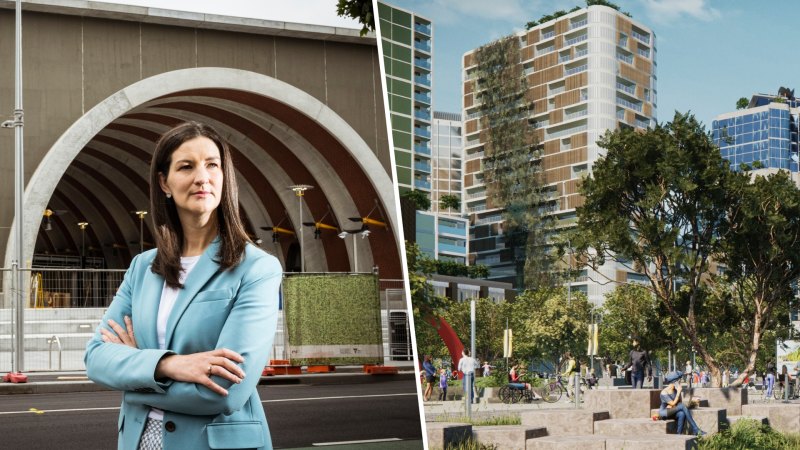Save articles for later
Add articles to your saved list and come back to them any time.
Key points
- The new inner-city suburb of Arden is to become an employment and innovation precinct with 34,000 jobs and up to 20,000 residents
- Thousands more people are also expected to move into redeveloped public housing estates in the area in future.
- But plans for the precinct redevelopment around the new Arden Station so far include only one primary and no secondary schools.
- Children in the area are zoned for the only public secondary school in the electorate, University High School, which is at 110 per cent capacity.
- Advocates are pointing to Docklands, where only one primary school was built, before it quickly became insufficient for the population.
A new inner-city suburb expected to house up to 20,000 people will have only one public primary school, despite other campuses in the area already approaching or exceeding capacity.
Plans for the 44-hectare precinct redevelopment around the new Arden Station in Melbourne’s north so far include only one primary and no secondary schools.
Greens MP Ellen Sandell at the under-construction Arden Station.Credit: Chris Hopkins
Greens MP Ellen Sandell says the planning is “incredibly short-sighted”, warning the government is in danger of repeating the mistakes of Docklands, which built only one primary school that quickly became insufficient for the population.
Sandell told a public accounts and estimates committee hearing on Wednesday that Arden would be a similar size to the regional city of Wangaratta, which had four public primary schools, one secondary school and a number of independent schools.
With many thousands more people also expected to move into redeveloped public housing estates in the area in the future, Sandell said it was clear one school would be “very much insufficient, very quickly”.
The Education Department’s 2022 Enrolment Pressure Index shows the closest primary school to Arden, North Melbourne Primary School, is at 92 per cent capacity.
Carlton Gardens Primary is at 119 per cent, Carlton North at 96 per cent, Kensington Primary School 85 per cent and Docklands Primary School 75 per cent.
Education Department secretary Jenny Atta told the committee hearing the department would continue to monitor available capacity. She said secondary school provision across the area was a “live issue”.
“It’s important that we keep refreshing that work because those projections can change,” she said. “We’ve seen in some of the growth corridor areas that growth has exceeded what has been projected.”
The Victorian Planning Authority’s public information says Arden will become an employment and innovation precinct with 34,000 jobs and 15,000 residents, but planning authorities confirmed in Wednesday’s hearings the population could be closer to 20,000.
Renders of the new Arden Precinct in North Melbourne, which planning authorities say will have a population of about 20,000 by 2050.
Sandell said she had been told by the Planning Department that Arden’s population would be mostly “key workers”, not families.
She compared Arden to Docklands, where the government was forced to acquire land to build a school after not including one in the original plan. Just two years after opening, the government was forced to expand the school into a nearby shopping centre.
Children in the area are zoned for the only public secondary school in the electorate, University High School, which is at 110 per cent capacity.
Sandell, who was instrumental in campaigning for Docklands Primary, said the government’s own policy encouraged families to live near transport hubs and the government should have the foresight to plan adequate schooling to match.
The Arden precinct could include about 20,000 residents and 34,000 workers. Credit:
“When Docklands was developed, the government did not expect families to live there, so no school was provided for. Of course, many families did choose to make Docklands home and parents had to campaign for a long time to build a primary school,” she said.
“This is exactly what happened in Docklands, which was a huge failure.”
Docklands Primary School parent Mary Masters said the government needed to earmark inner-city land now for future education facilities.
Masters, who has children in prep and grade 2 at Docklands, was one of a group of parents who questioned the capacity of the school before its opening in 2021.
Docklands Primary enrolled 100 preps the first year and has welcomed the same number every year since. This year, the government was forced to open a second campus to meet demand.
Masters said it was clear families wanted to send their children to school in Melbourne’s inner-city, but there were not enough facilities to cater for the demand.
To not consider Arden for more primary schools or a secondary school was “so narrow-sighted it’s ridiculous,” she said.
“City living is desirable. People want to be living here and they want to be raising their families here. We don’t want to have to move out to the suburbs in order to get into a school.”
The government was forced to acquire land to build a school in Docklands and expand into a nearby shopping centre, after not including one in the original plan.Credit: Paul Jeffers
Masters said the lease of shopping centre space bought Docklands Primary some time but was not a permanent solution.
“They can’t just keep us in a shopping centre for the next 10 years. But all the sites nearby got sold off to developers and now they’re having to negotiate with developers if they want to get some land back for schools.
“Hopefully they don’t repeat the same mistake with Arden. Just put the land aside now, build new high schools, build new primary schools.”
The Education Department has been contacted for comment.
Get the day’s breaking news, entertainment ideas and a long read to enjoy. Sign up to receive our Evening Edition newsletter.
Most Viewed in National
From our partners
Source: Read Full Article





